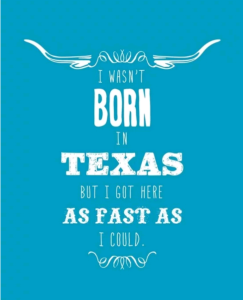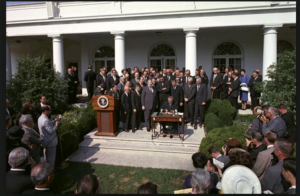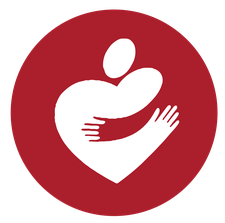This guest blog was written by Karen Keith at the Texas Department of Housing and Community Affairs (TDHCA). TDHCA is the CSBG Grantee for the State of Texas.
 I’m not a native Texan; however, I did get here as quickly as I could and I take great pride living in and working for this great State of Texas. Texas is well-known for many things, including The Alamo, cowboy hats and boots, the best BBQ, Friday Night Football (yes, we do capitalize each word when discussing this subject), Dr. Pepper, and just for being so darn big! Texans are also known for their big hearts and welcoming spirit too. They help one another in times of trouble – Hurricanes Ike, Harvey, and Tropical Storm Allison to name a few. While Texas is no stranger to destructive weather and other disasters, we still are very thankful to live in a state where everyone supports each other and comes together in times of need. Texans supporting one another is best exemplified by our network of 40 Community Action Agencies (CAAs) that serve all 254 counties of our great state. #WeAre40Strong
I’m not a native Texan; however, I did get here as quickly as I could and I take great pride living in and working for this great State of Texas. Texas is well-known for many things, including The Alamo, cowboy hats and boots, the best BBQ, Friday Night Football (yes, we do capitalize each word when discussing this subject), Dr. Pepper, and just for being so darn big! Texans are also known for their big hearts and welcoming spirit too. They help one another in times of trouble – Hurricanes Ike, Harvey, and Tropical Storm Allison to name a few. While Texas is no stranger to destructive weather and other disasters, we still are very thankful to live in a state where everyone supports each other and comes together in times of need. Texans supporting one another is best exemplified by our network of 40 Community Action Agencies (CAAs) that serve all 254 counties of our great state. #WeAre40Strong
 Texas is the birthplace of former President Lyndon B. Johnson. Fifty-five years ago he signed the Economic Opportunity Act which created Community Action, giving rise to the robust CSBG network as we know it today. But It all started in the little town of Cotulla, Texas, where LBJ was a student teacher earning money to continue with his education. He never forgot the students he taught or the poverty he observed, and he wanted to make a change for them and the many others struggling to get by.
Texas is the birthplace of former President Lyndon B. Johnson. Fifty-five years ago he signed the Economic Opportunity Act which created Community Action, giving rise to the robust CSBG network as we know it today. But It all started in the little town of Cotulla, Texas, where LBJ was a student teacher earning money to continue with his education. He never forgot the students he taught or the poverty he observed, and he wanted to make a change for them and the many others struggling to get by.
Today, TDHCA and our 40 CAAs work to continue LBJ’s legacy in the large, diverse, and fast-growing state that is Texas. Texas is a fascinating state to travel, and as state staff at TDHCA we frequently road trip around the state to train local staff and to get a first-hand look at how poverty impacts our many different communities. Texas contains 3 of the top 10 largest cities in the US: #4 – Houston, #7 – San Antonio, and #9 – Dallas. Add to that Texas has 4 cities with more than a million people, 36 cities with between 100,000 and 1 million people, as well as a whole host of small rural towns and counties. You name it, we’ve got it and each setting comes with a unique set of challenges for those living in poverty.
This year as Community Action Month approached, I’ve been asking myself this question: “Why do you do what you do?” I discovered that for me the answer is simple – it’s my passion; it’s embedded in my DNA; and I personally know the difference we can make. Assisting our agencies, meeting the clients, and consulting with staff who lift others up is a professional and personal pleasure. And I know first-hand that any one of us could fall on hard times and find ourselves in need of the services of Community Action. In fact, I was personally the recipient of services a short 3.5 years ago. I know the importance of “seeing, then hearing” someone. I often wonder where I would be today had no one seen or heard me in my time of need. That thought fills me with great sadness, but also such gratitude for those that changed the trajectory of my life.
Recently during a training of CAA staff, I asked the question “Why do you do what you do?” and followed it with my personal story, describing where CAAs succeeded and failed with me. After the training, a long-timer in this field thanked me. I asked him why, and his response: “Because I forgot why I do what I do. You rekindled my purpose.” Seeing Community Action, in action, is remarkable. My hope is to kindle that passion to change the direction of someone’s life in others when I provide training and assistance to our CAAs.
One changed life has a ripple effect; not only for the client but also for their family and for the community at large. Hearing the “success stories” from our agencies is always a joy and I remind staff that it is okay to brag about those successes (another thing about Texans is we do know how to brag!). As a reminder, we also need to look at the ones who didn’t succeed, see what we can do differently, and seek to continuously improve the impact we have on individuals, families, and communities.
Why do I do what I do? I do it for the people in need across our 254 counties, those vulnerable, low-income individuals across this state who need a hand-up along their journey. It is for the Community Action Staff who put their heart into this work each day. I do this work because every effort matters. #BeCommunityAction every day, in everything.





